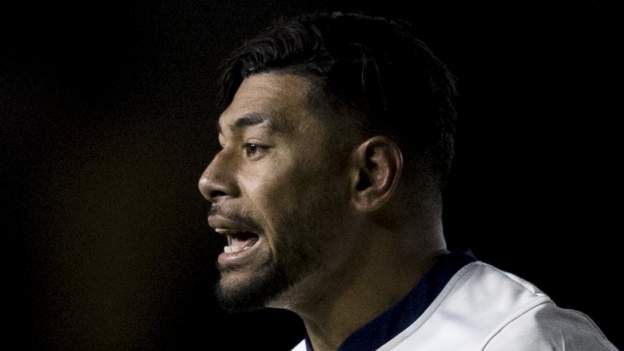
New Zealand's Charles Piutau says he has "two countries close to his heart" after confirming his intention to switch nationality to represent Tonga.
Piutau, who was born in Auckland and won 17 caps for the All Blacks, is a high-profile beneficiary of a major change to rugby union's international eligibility rules.
And the Bristol back hopes it starts a revolution in Pacific Island rugby.
"I'm really happy for the Pacific nations," Piutau said.
The 30-year-old told the BBC's Sports Desk podcast: "It's not the answer to everything - it's just the start.
"Having more scheduled games, more games against Tier One nations, the two teams that have joined the Super Rugby competition will add more depth, [while] the experienced players [switching nationality] will be able to add into the Pacific nations."
After the eligibility changes were approved by World Rugby's council meeting last month, from January 2022 a player will now be able to represent a different country after a stand-down period of three years.
A player can move to a nation of their, their parents' or grandparents' birth, but can only switch allegiance once.
Piutau, who won his All Blacks caps between 2013 and 2015, denies the concept of switching nationality threatens the integrity of the international game, and explains how he has strong familial and emotional ties to both New Zealand and Tonga.
"I can see that perspective but I think for myself, like many other people, when you've grown up and you've got two cultures that are close to your heart, how can you just say that this one's going to be the only one?" he said.
"Both my parents were born in Tonga, then migrated to New Zealand. Two of my older siblings were born in Tonga and the rest of us were born in New Zealand.
"Obviously my parents' first language is Tongan so at home, I would communicate in Tongan and having my brother playing for Tonga, captaining Tonga, there's always a close connection.
"Our family would always be supporting when I play for New Zealand, and [if] Tonga were playing, our family would be extremely proud and cheering both teams on."
Piutau is one of a handful of players who will likely bolster Tonga's resources at the next Rugby World Cup, while Samoa are the other Pacific nation most likely to prosper from the ruling.
But many other emerging nations, such as Uruguay, Chile, Russia and Georgia, are not set to benefit in the same way, given their onus on picking home-grown players, while there are fears the new laws could be exploited by players moving to, or between, tier one countries.
The chief executive of World Rugby, Alan Gilpin, admits there may be unintended consequences, but is convinced the regulation will boost the global game and lead to a more competitive international scene.
"There's definitely that view that this is a Pacific Island measure," Gilpin told the Sports Desk.
"It's not, although there is no doubt that because they've produced this incredible rugby talent over a long period of time they are going to benefit from players going back and being eligible to play for those nations; we are not shying away from the fact there will be a benefit to the Pacific Islands.
"I think the important thing with the work we've done over the last year, and the reason why it's been a massive consultation process, is this is ultimately something that the game as a whole has supported.
"Portugal, Spain, Germany, Romania, some of the countries in South America, so into Uruguay, certainly, Namibia, all those countries can benefit. They've all produced players that may have been captured.
"There are clearly going to be some moves that people are going to look at and say, 'well, is that what really you were looking to achieve when you set out?'
"I don't think there is any particular unintended consequence we are concerned about, we've just got to be very careful and thoughtful as we move forward in trying to make sure we're being consistent in the way we apply it."















 Phone: (800) 737. 6040
Phone: (800) 737. 6040 Fax: (800) 825 5558
Fax: (800) 825 5558 Website:
Website:  Email:
Email: 






